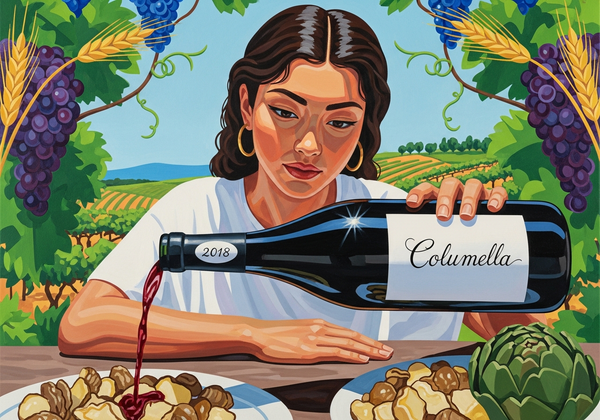Germany’s Mosel Wine Region: A Symphony in Every Sip

Imagine standing upon a winding riverbank, a shimmering ribbon of water gently caressing steep vineyards, each vine stretching skyward in defiance of gravity. You breathe deeply, inhaling crisp air tinged with the perfume of blossoms and slate-rich earth. Welcome, dear reader, to the Mosel—the beating heart and poetic soul of German viticulture.
Echoes of the Past: A History in Vines
The story of Mosel wine unfolds like a classic novel: dramatic, captivating, and sprinkled generously with tales of triumph and survival. Over 2,000 years ago, the Romans planted the first vines along the Mosel River, recognizing its steep slopes and sunlight-kissed banks as a divine gift. Through medieval times, monasteries nurtured these vineyards, transforming the Mosel into Europe's vinous epicenter.
But the region has not been without its challenges. Wars, disease, and shifting tastes have tested Mosel’s resilience. The late 19th-century devastation by phylloxera threatened extinction, yet the Mosel rallied, resurrecting itself vine by precious vine. Post-war Germany saw Mosel wines once again embraced by the world, led by iconic producers who championed quality over quantity.
Today, the Mosel stands proudly among wine's royalty, its history imprinted in every sip—a liquid testament to endurance.
Nature’s Masterpiece: The Essence of Terroir
Terroir is to wine what a melody is to music—the intangible magic that transforms mere notes into art. The Mosel’s terroir is uniquely dramatic: impossibly steep slopes, rich slate soils, and a cool, northerly climate dance together, creating an unparalleled environment for growing grapes, especially Riesling.
Slate soils are the region's secret conductor, absorbing heat during the day and slowly radiating warmth at night, ensuring grapes ripen fully despite chilly evenings. This mineral-rich earth imparts a distinct, stony character, a signature minerality that enthusiasts treasure.
The Mosel River itself plays a nurturing role, reflecting sunlight onto vines, protecting them from frost, and moderating temperatures. Imagine it as a gentle caretaker, ensuring each grape reaches its delicious potential.
Stars Among Vines: Mosel's Visionaries
The Mosel’s vineyards are like stages, showcasing the talents of legendary and innovative producers. The historic estates of Dr. Loosen, Joh. Jos. Prüm, and Egon Müller are names whispered reverently among wine lovers. Dr. Loosen, led by the charismatic Ernst Loosen, redefined Mosel wines for modern palates, marrying tradition with forward-thinking innovation. Joh. Jos. Prüm’s delicate, age-worthy Rieslings have set global benchmarks, while Egon Müller commands cult-like devotion, producing wines so rare and exquisite they are as precious as liquid diamonds.
Contemporary stars like Clemens Busch and Markus Molitor are pioneering sustainability and showcasing meticulous craftsmanship, crafting wines that sing vividly of their terroir.
Poetry in a Glass: Iconic Styles and Sensory Symphony
Mosel wines whisper poetry, enticing the senses with their finesse and vibrant character. Riesling reigns supreme, celebrated in styles from bone-dry Trocken to lusciously sweet Eiswein.
Take a sip of a classic Mosel Riesling Kabinett, and you're greeted with aromas of green apple, white peach, and elderflower, underscored by a crystalline acidity that sparkles across the palate. Spätlese offers deeper complexity, introducing honeyed notes, citrus blossoms, and a hint of petrol—a hallmark of aging Riesling. Auslese and Beerenauslese wines delight the senses with luxurious sweetness, like liquid sunshine captured in a bottle, balanced impeccably by sharp acidity.
Winemaking in the Mosel emphasizes purity and precision. Gentle pressing, minimal intervention, and meticulous sorting ensure each wine vividly expresses its birthplace, with a transparency as captivating as fine lace.
Liquid Treasures: Investing in Mosel's Legacy
Mosel wines hold a distinguished place among collectors, appreciated not just for their intrinsic beauty, but for their market value and investment potential. Rare vintages from iconic producers such as Egon Müller Scharzhofberger Trockenbeerenauslese command prices rivaling Bordeaux First Growths. Their scarcity and impeccable provenance position them as astute investments.
Market trends show steadily increasing global demand for top-tier Mosel Rieslings. Investors appreciate these wines for their longevity, potential appreciation, and relative affordability compared to other world-class wines. Owning a pristine bottle of Mosel’s finest is akin to holding a piece of living history, growing in value and stature year by year.
Adapting Gracefully: Mosel Amidst Climate Change
Climate change has introduced new rhythms to Mosel’s winemaking dance. Warmer temperatures have resulted in earlier harvests and riper grapes, presenting both challenges and opportunities. Producers now navigate a delicate balance, preserving the vibrant acidity and freshness that define Mosel wines.
Innovations abound: canopy management, earlier picking dates, and exploring higher-altitude vineyard sites have allowed producers to adapt gracefully, ensuring the soul of Mosel wine remains vibrant and true.
Guardians of the Earth: Sustainable Viticulture
In Mosel, sustainability isn't just trendy—it’s tradition evolving with intention. Producers like Clemens Busch champion biodynamics, viewing vineyards as interconnected ecosystems, thriving harmoniously with nature. Markus Molitor emphasizes organic viticulture, carefully nurturing vines without synthetic chemicals, respecting the land and future generations.
These visionary producers demonstrate that sustainability enhances quality, delivering wines that resonate authentically and responsibly.
Chang'e’s Secrets to Savoring Mosel
To fully savor Mosel wines:
- Cellaring: Kabinett and Spätlese wines blossom beautifully over 5–15 years; Auslese and Beerenauslese age gracefully over decades.
- Serving Temperature: Chilled but never ice-cold (around 45–50°F) allows aromatic complexity to fully bloom.
- Glassware: A slender Riesling glass elegantly funnels aromas and delivers the wine precisely onto your palate.
- Perfect Pairings: Fresh seafood, spicy Asian cuisine, creamy cheeses, or even roasted pork elevate the Mosel experience, creating delightful harmony.
Each bottle from Mosel is a story waiting to unfold—a tale told through aromas, flavors, and textures. Sip slowly, savor deeply, and let yourself become part of Mosel’s timeless romance.





